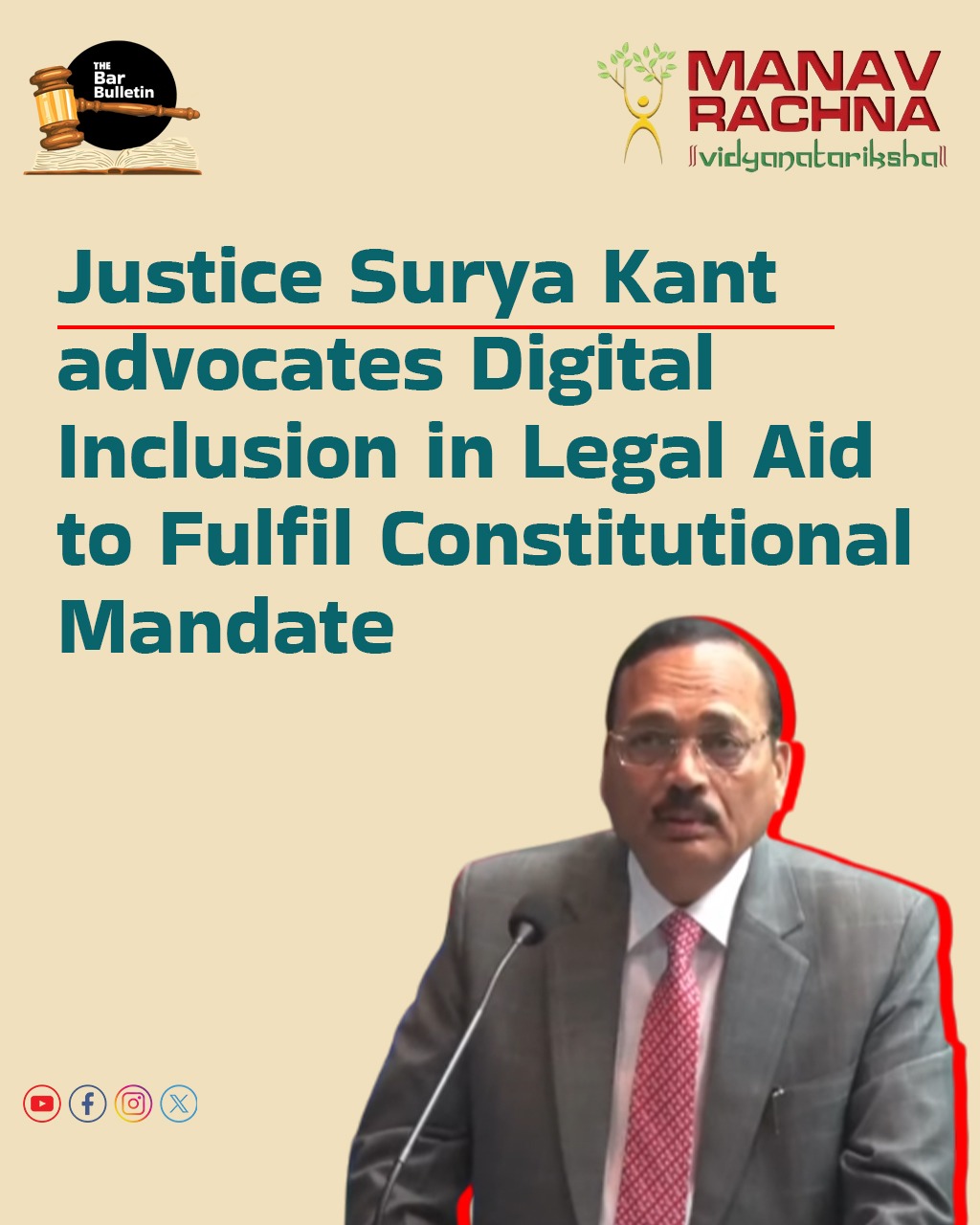In a powerful and forward-looking address at the 2nd Justice R.C. Lahoti Memorial Lecture hosted by the School of Law, Manav Rachna University, Hon’ble Mr. Justice Surya Kant, Judge of the Supreme Court of India, called for a transformative reimagining of legal aid in the digital age. Speaking on the theme “Bridging the Gap: Reimagining Legal Aid in the Digital Age for Inclusive Justice in India,” Justice Kant urged stakeholders across the legal ecosystem to harness technology not as a substitute for compassion, but as a means to amplify it.
The lecture was attended by Hon’ble Mr. Justice U.U. Lalit, former Chief Justice of India, Dr. Prashant Bhalla, Chancellor, and senior leadership of Manav Rachna University, alongside faculty members, legal scholars, students, and members of the judiciary and legal fraternity. Dr. Archana Mantri, daughter of late Justice Lahoti, also graced the occasion.
Honouring a Visionary Legacy
Justice Suryakant opened his address with a heartfelt tribute to Justice R.C. Lahoti, lauding him as a philosopher-jurist and a pioneer of judicial reforms. Recalling Justice Lahoti’s pivotal role in establishing the Supreme Court’s Mediation and Conciliation Project Committee and initiating the e-Courts Project, he highlighted his enduring legacy in expanding access to justice and strengthening the ethical foundations of the judiciary.
“Justice Lahoti reminded us that justice without compassion is justice in form, not in spirit. His life and work stand as a moral compass for our legal system,” Justice Suryakant remarked.
Bridging the Gaps in Justice Delivery
Justice Suryakant candidly acknowledged that despite constitutional guarantees under Article 39A, access to justice remains a distant promise for many especially the poor, women, children, tribal communities, persons with disabilities, and the digitally excluded. “For millions of Indians, the legal system is unintelligible, unaffordable, and unreachable,” he said.
While praising the contributions of NALSA and State Legal Services Authorities, he emphasised that brick-and-mortar legal aid models are increasingly insufficient. “The current framework is constrained by physical infrastructure and limited human resources. Digital innovation is not just an opportunity it is a necessity.”
Reimagining Legal Aid in a Digital India
Justice Suryakant laid out a comprehensive blueprint for inclusive legal aid in the digital era, built on innovation, accessibility, and empathy. Key highlights of his vision include:
- Development of a multilingual NALSA Companion App to provide legal information, rights-based guidance, and direct connection to legal volunteers, accessible through voice, text, and video formats.
- Integration of AI and Natural Language Processing (NLP) to simplify legal documents, translate court orders into regional languages, and respond to legal queries in dialects such as Bhojpuri, Kannada, and Rajasthani.
- Expansion of tele-law and virtual Lok Adalat services, enabling litigants—particularly in remote areas—to access justice without travel or procedural barriers.
- Use of Virtual and Augmented Reality (VR/AR) to simulate courtroom environments for trauma survivors, children, and persons with disabilities to prepare for legal proceedings.
- Crowdsourcing legal support, involving young advocates, law students, and retired professionals to build scalable, community-driven digital legal aid ecosystems.
Justice Suryakant also underscored the ethical and inclusive design of digital platforms. He called for mandatory digital literacy campaigns, especially targeting women, rural youth, and the elderly. He stressed the importance of accessibility features such as screen readers, voice navigation, and inclusive interfaces for persons with disabilities.
“Digital justice must never come at the cost of human dignity or data security. We must embed empathy, privacy, and fairness in every digital solution we create,” he urged.
Call for Collaborative Action
Justice Suryakant emphasised that no single institution can drive this transformation alone. He called for synergistic collaboration among government agencies, legal-tech startups, law schools, civil society organisations, and the judiciary.
“Law schools must become incubators for legal-tech innovation. Civil society must guide us with ground realities. And the government must invest in robust digital infrastructure across rural and urban India.”
Looking Ahead: A Human-Centric Justice System
In his closing remarks, Justice Suryakant reminded the audience that justice, though enabled by technology, remains a fundamentally human act.
“Machines may write poetry and algorithms may predict behaviour, but justice is still rendered by conscience. The greatness of the law lies not in authority, but in service.”
He called for a future where every citizen from urban centres to remote villages—can access legal assistance with a single phone call, without fear or confusion. “In this reimagined world, no one shall stand alone before the court,” he concluded.



